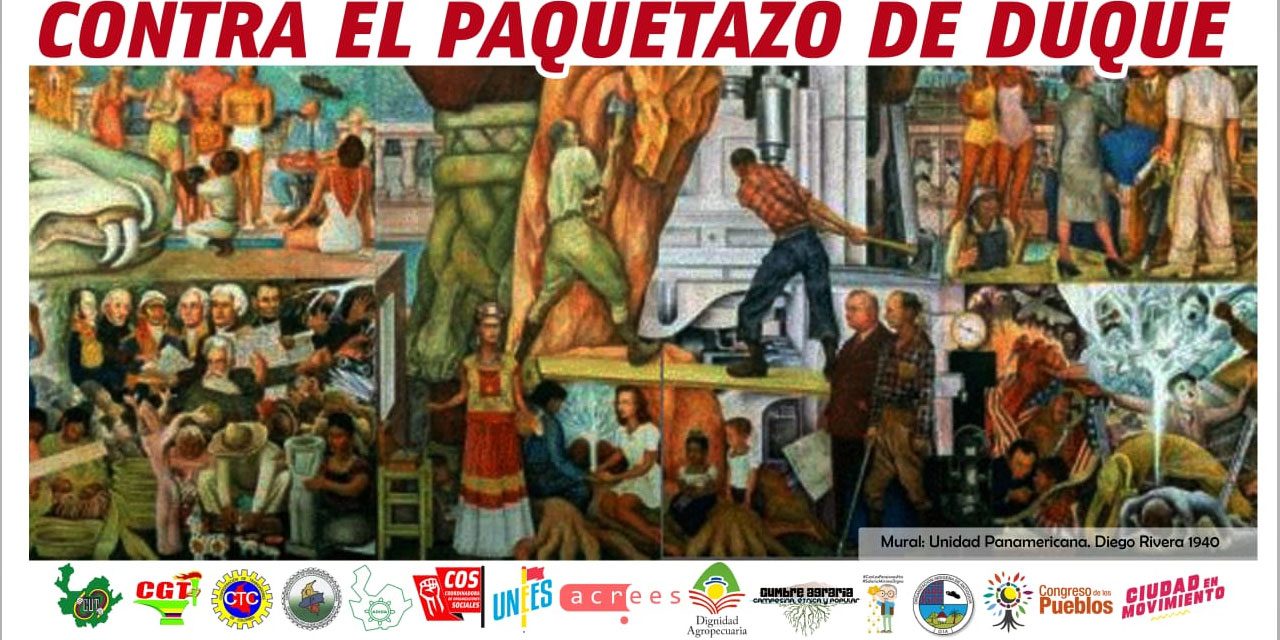Colombia’s government is on the edge of its seat as labor unions are on strike and a multitude of social organizations have announced massive anti-government protests.
The strike was initially called by the labor unions in protest of what has since become known as President Ivan “Duque’s Great Package” of pending labor and pension reforms.
The other organizations, some of whom are able to mobilize huge crowds, are protesting for entirely different reasons.
Many demand Duque ends his government’s resistance to the implementation of a 2016 peace deal with the FARC.
What all have in common is that they reject Duque’s refusal to talk to organizations and impose his policies without meaningful dialogues with the affected communities.
A national strike this big hasn’t been seen in Colombia since 1977 and has the government in a state of panic because it reportedly believes it is part of an unfounded international conspiracy to overthrow the government.
Where protests are held
Labor unions

Members of labor union CUT
The labor unions called the national strike in the beginning of October to protest at the government’s economic policies, and in particular pending labor and pension reforms, and “the policies of Duque that are destroying the nation and peace.”
According to the labor unions, the government wants to “establish hourly pay, different minimum wages per region, the elimination of the payment of overtime, Sundays and holidays, compensation for dismissal, among others.”
In regards to pensions, the unions have said Duque seeks “increases of pension age and contribution, decrease in pension payments and the worst, the establishment of an individual savings system eliminating solidarity.”
Students

Student protests in Barranquilla last month. (Image: Twitter)
Colombia’s largest student organizations joined the labor unions from the beginning, initially out of solidarity with the labor unions, “against Duque, his labor and pension reforms” and to demand “the compliance of agreements and the right to protest.”
The students have since added that they want the dismantling of controversial riot police unit ESMAD, which has violently repressed student protests in Bogota where students were protesting against corruption.
Duque struggling to respond to Colombia’s swelling student protests
Indigenous organizations
Cristina Bautista (Image: Twitter)
Colombia’s national indigenous organization ONIC announced all indigenous organizations would join the protests after the killing of indigenous governor Cristina Bautista in a massacre late October.
The massacre was the final straw for the indigenous organizations, who have been demanding attention to an ongoing genocide of native Americans since March.
The ethnic violence escalated after Duque refused to meet with indigenous authorities in the southwestern Cauca province in April. Also the indigenous people demand the government immediately implement a 2016 peace deal with FARC guerrillas that is opposed by Duque’s far-right party.
Additionally, the native Americans want the government to comply with more than 300 previously made agreements that were never complied with.
Duque criticized from all sides over Colombia’s indigenous ‘genocide’
Black minority leaders
Killed black minority leader Temistocles Machado.
Like the native Colombians, black minority leaders have lost dozens of leaders in assassinations over disputes related to the protection of their autonomous territories against drug traffickers, illegal miners and multinationals.
Also the black minority leaders want Duque to implement the peace deal as agreed by former President Juan Manuel Santos.
Black communities in the west of the country have suffered more than any other group of ongoing armed conflict between illegal armed groups that have taken advantage of the state’s failures to implement the peace deal.
Colombia lost 3 million black people in census
Farmers
Farmers are protesting because of the negative effects they have experienced due to free trade agreements with the United States and the European Union where farmers receive major subsidies.
Currently, the farmers are worried about the European demands to allow the import of potatoes, a vegetable that originally comes from the western hemisphere.
Previously, rice farmers claimed that they were condemned to poverty because the free trade pact with the US obliges them to sow “certified” genetically modified American rice that, because of controversial patent claims, could not be resown.
Armed conflict victims
Victims of state violence, in particular victims of extrajudicial killings, said they would also join the march to demand Duque’s compliance with the peace deal.
The president’s far-right party has always acknowledged the rights of FARC victims, but has ignored the victims of state violence, most of whom were killed when Duque’s political patron, Alvaro Uribe, was president.
The victims are particularly offended because the “uribistas” deny the existence of an armed conflict and have consistently tried to make the victims of the military and paramilitary groups invisible.
Opposition parties and center-right lawmakers
Opposition parties and several center-right politicians will march to demand Duque’s compliance with the peace deal and an end to his persistence in trying to govern without majority support in Congress.
Duque’s Democratic Center party, furthermore, on multiple occasions has pulled dirty and possibly illegal tricks to have their agenda pushed through Congress or to block initiatives by other parties.
Centrist and center-right lawmakers have also joined the march, because they want to convince Duque to stop relying entirely on his far-right party and form a broader coalition that would improve governability.
Everybody else who is pissed off
Apart from the aforementioned organizations, taxi drivers, air traffic controllers, women’s rights organizations and LGBT activists will join, all to demand attention for their grievances.
But most importantly, a lot of people are said to be joining because of Duque’s apparent inability to govern.
Fifteen months after taking office, Duque’s political party received an electoral beating last month and, according to the last poll, the president is disapproved of by 69% of the population.
Some of these individual supporters have said they would join the protests over his loyalty to his allegedly criminal political patron’s fraud and Duque’s ongoing denial of common grievances.


